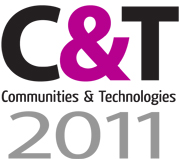Two QUT guest seminars by Dr Anne Galloway
The Urban Informatics Research Lab, the Institute for Creative Industries & Innovation, the ARC Centre of Excellence for Creative Industries & Innovation, and BEE School of Design are proud to present guest seminars by:
Dr Anne Galloway, Victoria University of Wellington
1. Speculative Design as a Research Method
Monday, 30 August 2010, 11 am – 12 noon
Please RSVP by 24 August 2010 to Ben Kraal <b.kraal@qut.edu.au>
Queensland University of Technology, Gardens Point Campus, S Block, room 620
Abstract
Design is increasingly seen as a creative and productive means of engaging imagined social and technological futures, but what kind of knowledge is being produced and how can we assess the impact of this kind of research? This talk outlines a project that aims to address these methodological concerns through a critical exploration of how NZ’s merino wool industry could be reconfigured by future RFID-based animal and product traceability initiatives.
2. Counting Sheep: New Zealand Merino Wool in an Internet of Things
Tuesday, 31 August 2010, 11 am – 12 noon, followed by light refreshments (to 1 pm)
Please RSVP by 25 August 2010 to julieanne.edwards@qut.edu.au
Queensland University of Technology, Council Room (A105), A Block (map)
Victoria Park Rd, Kelvin Grove QLD 4059
Abstract
Pervasive computing brings together wireless, networked and context-aware technologies, including Global Positioning System (GPS), environmental sensors and Radio-Frequency Identification (RFID), to embed computational capacities in the objects and environments that surround us. The “Internet of Things” is a related vision for future computing that proposes a shift from a network of interconnected computers to a network of interconnected objects. By virtue of their status as highly regulated and globally traded commodities, livestock animals and animal products have long been tracked and are primed to be amongst the first non-humans in such a network. Specifically, RFID-enabled livestock traceability programmes are increasingly being mandated by governments and agricultural industries worldwide to better support management of disease outbreaks and maintain access to high-value export markets. In these technologically determinist traceability scenarios, animals are largely envisioned as manageable and saleable information and farmers are more often positioned as technicians and data collectors than as animal caregivers.
This project investigates the role that cultural studies and design can play in presenting both producers and consumers with alternate visions for the future of human-animal relations. Through a juxtaposition of technological livestock management programmes and non-technological wool industry products and services, this presentation will critically question the social and cultural implications of emergent technologies and existing traceability efforts. Particular attention will be given to articulating research practices and stakeholder relations that can significantly engage relevant issues and avoid the pitfalls of both dystopian and utopian futurism.
Biography
Anne recently relocated from Canada (a.k.a. The Great White North) to take up a position as Senior Lecturer in Design Research at the School of Design, Victoria University of Wellington, New Zealand. Drawing on a background in sociology and anthropology, her research focusses on emergent technologies in their visual, discursive, material and practical manifestations. Anne really likes animals and technology, and you can learn more about her and the world’s best cat™ on the web at plsj.org or on twitter @annegalloway.


